Brown County United Way provides key piece to help move Green Bay affordable housing project forward
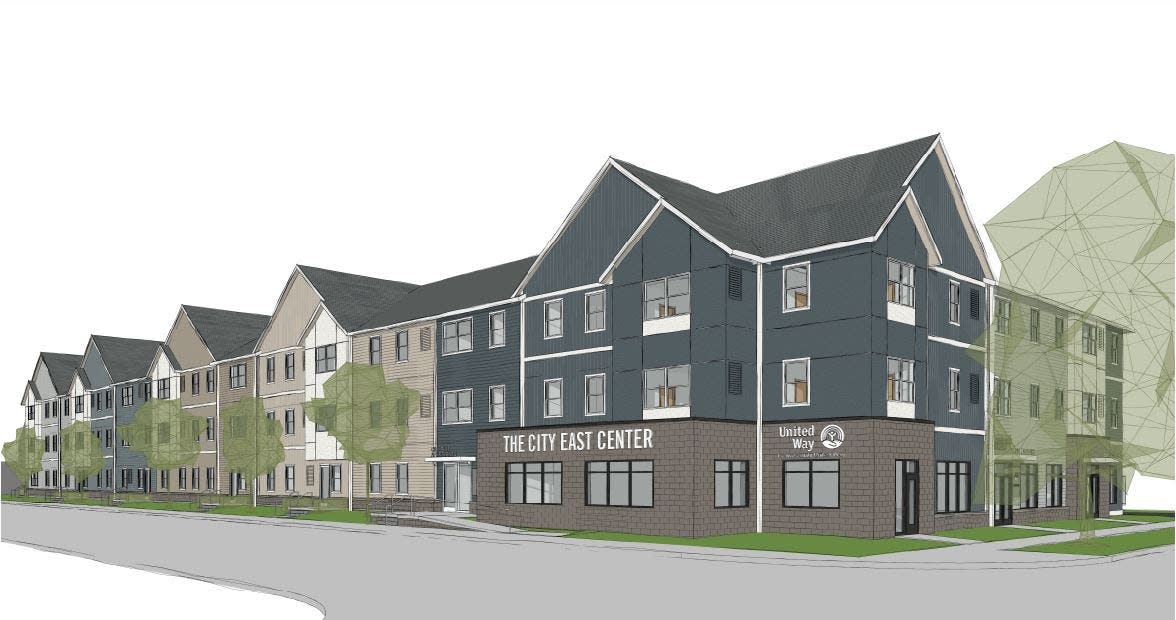
GREEN BAY – The Brown County United Way provided the final piece of the puzzle Thursday in an Appleton developer's plan to build 43 units of affordable housing near downtown Green Bay.
Robyn Davis, Brown County United Way’s CEO, said the agency will occupy first floor-space in the City East building proposed on vacant, city-owned land in the 1100 block of East Walnut Street. The space will primarily be a neighborhood community house made possible partly thanks to a a $1 million federal grant, which came from an omnibus spending bill with the help of U.S. Sen. Tammy Baldwin’s office.
The 5,000-square-foot, space will serve as classrooms, meeting areas and event space to enable community nonprofits that address such areas as job skills and mental health to meet building tenants and neighborhood residents where they live. The United Way will also move its operations from its current home on Adams Street into the City East space.
MF Housing Partners, City East's developer, has spent nearly 18 months working through financing challenges and funding gaps that often hamper, if not halt, builders' and communities' efforts to construct much-needed affordable housing. The group needed millions of dollars in state and city assistance, the United Way's partnership and perseverance to get to this point, where a summer construction start is in sight.
Related:Can high-end housing and affordability coexist in this downtown Green Bay neighborhood?
United Way super excited to be 'in the center of where we want to be'
The building will feature much-needed affordable housing near where Joannes Park, Whitney Park, Navarino and Downtown neighborhoods intersect. Since 2017, the United Way's Thriving Neighborhoods Initiative has focused on those four neighborhoods, investing resources and establishing community partnerships toward a goal to improve the standard of living for 10,000 Brown County residents.
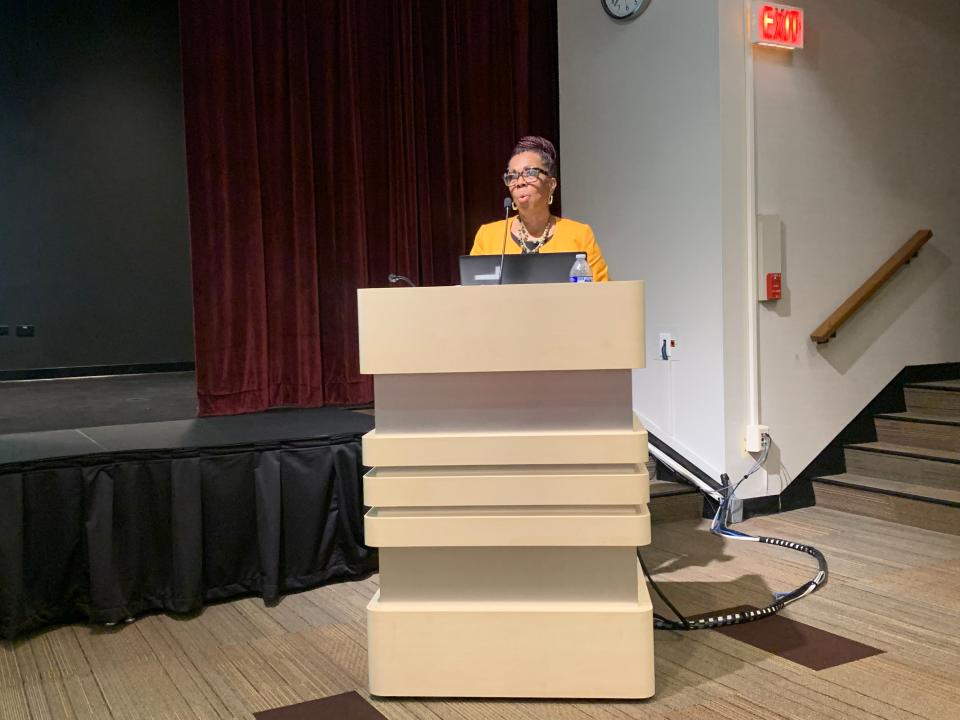
“We never thought we’d have a space attached to an affordable housing development,” Davis said. “We are super excited about this next step as well as the neighborhood partnership grants we’re already getting out into the community.”
When Mayor Eric Genrich contacted Davis about City East, Davis said it was the type of opportunity the organization had been looking for. The flexible uses for the space and programming plans mean community support agencies, including the United Way staff, will be able to hear directly from building tenants and residents about their needs.
"That's in the center of where we want to be, where we can hear neighbors, talk to neighbors," Davis said. "The opportunity to create a space where neighbors can come together and grow together was really important."
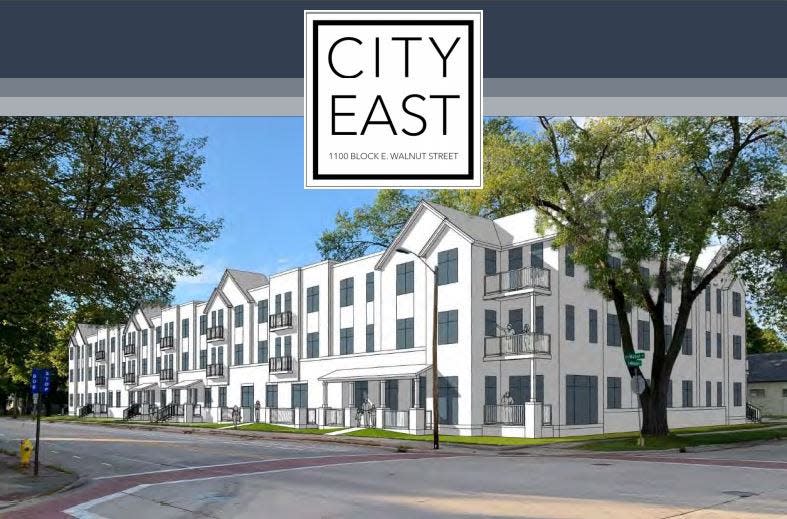
What, and where, is City East?
City East is an $11 million, three-story apartment building proposed for vacant, city-owned land in the 1100 block of East Walnut Street, between North Roosevelt and North Clay streets.
MF Housing Partners, a partnership between Mosaic Property Ventures and FORE Development + Investment Group, also sought to develop affordable housing in Appleton as well. In October 2021, it secured a planning option from Green Bay's Redevelopment Authority for the East Walnut Street site.
The building's details have largely remained the same since 2021: There will be 43 one-, two- and three-bedroom units in the building with part of the first-floor space set aside for community programming and services, a role United Way will now fill.
The city has long targeted the site as an ideal location for affordable housing. Three other organizations have proposed housing projects in 2016, 2020 and 2021, but most failed to secure low-income housing tax credits awarded each spring by the Wisconsin Housing and Economic Development Authority (WHEDA).
Will Peters, a neighborhood development specialist with the city of Green Bay, said the financing gaps have long gotten in the way of building on a site attractive for its proximity to parks, retail, bus stops, schools and downtown Green Bay.
“It’s not this site, but the affordable housing landscape right now,” Peters said, noting that market rate housing projects struggle with rising material prices, supply chain issues and the labor market, too. “It makes it harder and harder to fill those financial gaps that arise when you try to build housing with affordable rents.”
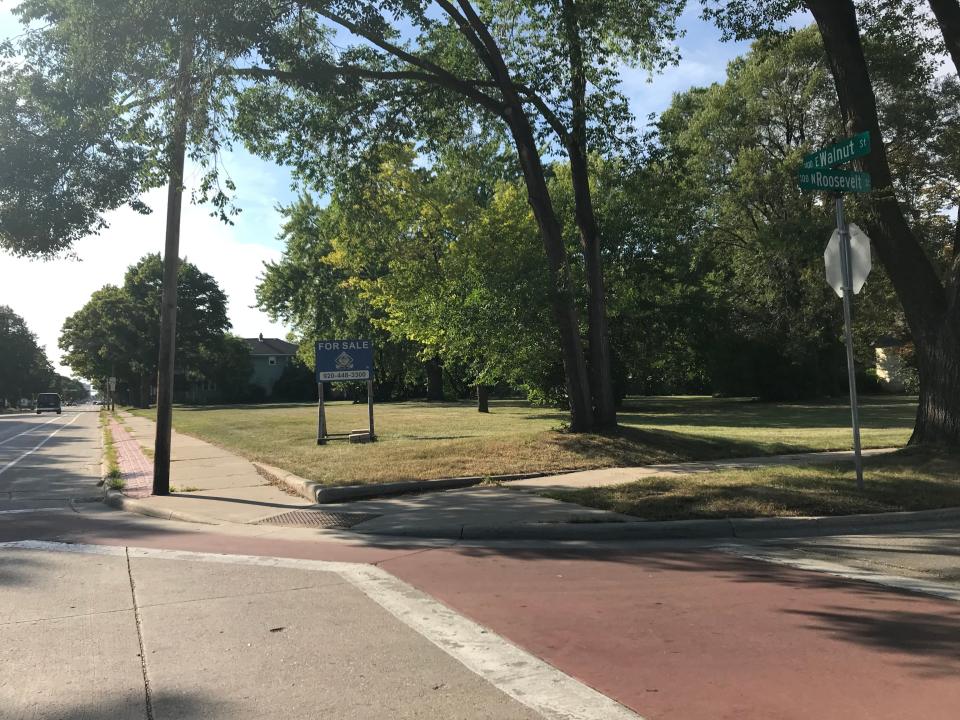
How much will Green Bay, WHEDA contribute?
More than $7 million will come from the city of Green Bay and WHEDA.
MF Housing didn't originally receive a tax credits award from WHEDA last year, but later in 2022 the state agency contacted MF Housing's Marissa Downs to notify her City East had received an award. Jon Searles, a community and economic development officer with WHEDA, said City East will receive $6.1 million in low-income housing tax credits. Searles said the project evolved into an "ambitious undertaking by many partners."
Green Bay over the last year approved $1.1 million in loans and grants for City East to help close financing gaps. The funds include:
A $300,000 loan from the city’s American Rescue Plan Act funds
A $400,000 loan from the city’s “TIDAH” affordable housing development fund
A $400,000 grant from the city’s HOME fund, federal block grant dollars allocated to support affordable housing development and home repairs for low- and moderate-income families with housing costs and repairs
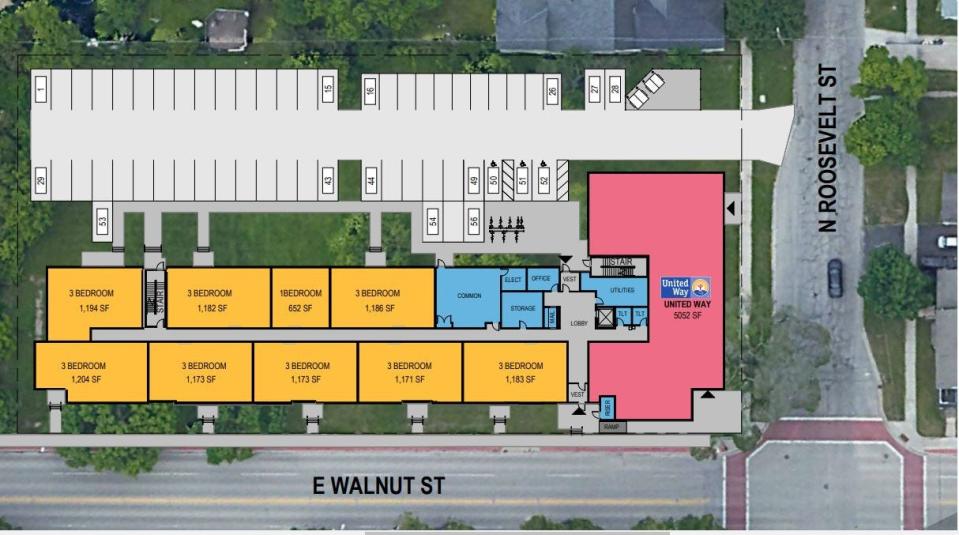
What makes City East affordable housing?
WHEDA tax credits and the city grants and loans all require MF Housing to set aside the majority of the units in the building for families that make less than 80% of the area’s median income, $62,000 for one person and $92,000 for a family of four in 2022, according to the U.S. Department of Housing and Urban Development.
City East will include nine units for families earning $27,750 or less, about 30% of the median income, 27 units for families earning less than $54,120, or 60% of the median income. The remaining seven units would be for rent at market rates.
The rents will be set at prices to ensure those families do not spend more than 30% of their monthly income on housing. Families that spend more than 30% of their income on housing are considered burdened by their housing costs. Downs expects rents will range from $430 to $1,400.
When will City East apartments be available for rent?
It will likely take another 18 months before the United Way and tenants can move in.
MF Housing and the city will need to finalize a development agreement that would lay out all the project’s financing, timelines, building details and each party’s responsibilities. It’s expected to come together by summer, Peters said.
Downs said she expects construction to start in July followed by 12 to 14 months of work before the building welcomes its first tenants. The United Way will renovate its space on a different timeline.
Contact Jeff Bollier at (920) 431-8387 or jbollier@gannett.com. Follow him on Twitter at@JeffBollier.

CONTINUE YOUR SUPPORT: Thanks to our subscribers for making this coverage possible. Be sure to download our app on the App Store or Google Play. Follow us on social media: Facebook | Twitter | Instagram | Newsletters
This article originally appeared on Green Bay Press-Gazette: United Way's help moves Green Bay affordable housing project forward

